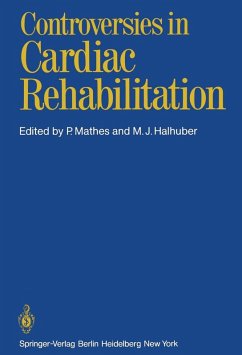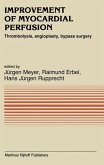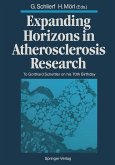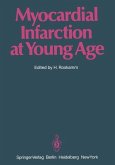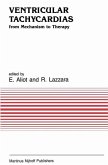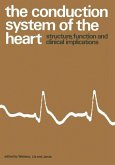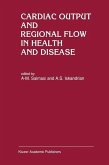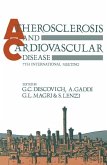Controversies in Cardiac Rehabilitation (eBook, PDF)
Redaktion: Mathes, P.; Halhuber, M. J.
40,95 €
40,95 €
inkl. MwSt.
Sofort per Download lieferbar

20 °P sammeln
40,95 €
Als Download kaufen

40,95 €
inkl. MwSt.
Sofort per Download lieferbar

20 °P sammeln
Jetzt verschenken
Alle Infos zum eBook verschenken
40,95 €
inkl. MwSt.
Sofort per Download lieferbar
Alle Infos zum eBook verschenken

20 °P sammeln
Controversies in Cardiac Rehabilitation (eBook, PDF)
Redaktion: Mathes, P.; Halhuber, M. J.
- Format: PDF
- Merkliste
- Auf die Merkliste
- Bewerten Bewerten
- Teilen
- Produkt teilen
- Produkterinnerung
- Produkterinnerung

Bitte loggen Sie sich zunächst in Ihr Kundenkonto ein oder registrieren Sie sich bei
bücher.de, um das eBook-Abo tolino select nutzen zu können.
Hier können Sie sich einloggen
Hier können Sie sich einloggen
Sie sind bereits eingeloggt. Klicken Sie auf 2. tolino select Abo, um fortzufahren.

Bitte loggen Sie sich zunächst in Ihr Kundenkonto ein oder registrieren Sie sich bei bücher.de, um das eBook-Abo tolino select nutzen zu können.
- Geräte: PC
- ohne Kopierschutz
- eBook Hilfe
- Größe: 31.2MB
Andere Kunden interessierten sich auch für
![Improvement of Myocardial Perfusion (eBook, PDF) Improvement of Myocardial Perfusion (eBook, PDF)]() Improvement of Myocardial Perfusion (eBook, PDF)40,95 €
Improvement of Myocardial Perfusion (eBook, PDF)40,95 €![Expanding Horizons in Atherosclerosis Research (eBook, PDF) Expanding Horizons in Atherosclerosis Research (eBook, PDF)]() Expanding Horizons in Atherosclerosis Research (eBook, PDF)73,95 €
Expanding Horizons in Atherosclerosis Research (eBook, PDF)73,95 €![Myocardial Infarction at Young Age (eBook, PDF) Myocardial Infarction at Young Age (eBook, PDF)]() Myocardial Infarction at Young Age (eBook, PDF)73,95 €
Myocardial Infarction at Young Age (eBook, PDF)73,95 €![Ventricular Tachycardias (eBook, PDF) Ventricular Tachycardias (eBook, PDF)]() Ventricular Tachycardias (eBook, PDF)40,95 €
Ventricular Tachycardias (eBook, PDF)40,95 €![The Conduction System of the Heart (eBook, PDF) The Conduction System of the Heart (eBook, PDF)]() The Conduction System of the Heart (eBook, PDF)97,95 €
The Conduction System of the Heart (eBook, PDF)97,95 €![Cardiac Output and Regional Flow in Health and Disease (eBook, PDF) Cardiac Output and Regional Flow in Health and Disease (eBook, PDF)]() Cardiac Output and Regional Flow in Health and Disease (eBook, PDF)233,95 €
Cardiac Output and Regional Flow in Health and Disease (eBook, PDF)233,95 €![Atherosclerosis and Cardiovascular Disease (eBook, PDF) Atherosclerosis and Cardiovascular Disease (eBook, PDF)]() Atherosclerosis and Cardiovascular Disease (eBook, PDF)40,95 €
Atherosclerosis and Cardiovascular Disease (eBook, PDF)40,95 €-
-
-
Produktdetails
- Verlag: Springer Berlin Heidelberg
- Seitenzahl: 207
- Erscheinungstermin: 6. Dezember 2012
- Englisch
- ISBN-13: 9783642683794
- Artikelnr.: 53204332
Dieser Download kann aus rechtlichen Gründen nur mit Rechnungsadresse in A, B, BG, CY, CZ, D, DK, EW, E, FIN, F, GR, HR, H, IRL, I, LT, L, LR, M, NL, PL, P, R, S, SLO, SK ausgeliefert werden.
- Herstellerkennzeichnung Die Herstellerinformationen sind derzeit nicht verfügbar.
The Traditional Concept of Risk Factors in Coronary Heart Disease - Has It To Be Changed?.- The Role of Diet.- The Role of Social Factors - Behavior Patterns or Risk Situations?.- The Role of Protective Factors.- Do the Standard Risk Factors Alter Their Role After the First Myocardial Infarction?.- Is There a Difference in Risk Factors in the Development of Angina Pectoris and Myocardial Infarction?.- Physical Activity as a Secondary Preventive Measure in Coronary Heart Disease - Yes or No?.- The Reasons for Recommending Physical Training as a Preventive Measure Following Myocardial Infarction.- Evidence to Date for the Beneficial Effect of Exercise Following Myocardial Infarction.- The Reasons for Detrimental Effects of Physical Training on Patients After Myocardial Infarction.- Coronary Surgery - A Measure of Rehabilitation?.- Does Surgical Therapy Alter the Prognosis of Coronary Heart Disease?.- Do Recent Changes in Medical Therapy Alter the Prognosis in Coronary Heart Disease?.- Long-Term Effects of Aortocoronary Bypass Surgery of Exercise Tolerance and Vocational Rehabilitation.- Return to Work After Coronary Surgery: Is There a Need for a Comprehensive Rehabilitation Programm?.- Higher Nervous Activity, Coronary Disease, and Sudden Death.- Adjusting to Coronary Artery Disease: Coping with the Problems of Convalescence Following Myocardial Infarction.- Evidence of a Relation Between Higher Nervous Activity and Sudden Death.- Incidence of Ventricular Arrhythmias in Coronary Artery Disease During Holter Monitoring and Stress Testing.- What Is Adequate Social Management of Patients with Coronary Heart Disease?.- Is the Influence of Social Classes in Rehabilitation of Cardiac Patients Inevitable?.- Patient and Family Education and Counseling: A Requisite Component of Cardiac Rehabilitation.- Is There Sufficient Appreciation of Vocational Counseling?.- What Kind of Organization Do We Need in Rehabilitation?.- Can We Improve the Prognosis of Coronary Heart Disease?.- Institutionalized, Residental Rehabilitation of Patients with Ischemic Heart Disease?.- Do Different Kinds of Social and Cultural Settings Require Different Kinds of Rehabilitation Programme?.- Which Diagnostic Procedures Are Really Helpful at Which Stage of Coronary Heart Disease?.- Stress Testing.- Contribution of Nuclear Cardiology to the Diagnosis of the Various Stages of Coronary Artery Disease.- Echocardiography in Coronary Artery Disease.- Towards the Optimal Lead System and Optimal Criteria for Exercise Electrocardiography.- Coronary Angiography.- Ambulatory Electrocardiographic Monitoring.- ECG Telemetry.
The Traditional Concept of Risk Factors in Coronary Heart Disease - Has It To Be Changed?.- The Role of Diet.- The Role of Social Factors - Behavior Patterns or Risk Situations?.- The Role of Protective Factors.- Do the Standard Risk Factors Alter Their Role After the First Myocardial Infarction?.- Is There a Difference in Risk Factors in the Development of Angina Pectoris and Myocardial Infarction?.- Physical Activity as a Secondary Preventive Measure in Coronary Heart Disease - Yes or No?.- The Reasons for Recommending Physical Training as a Preventive Measure Following Myocardial Infarction.- Evidence to Date for the Beneficial Effect of Exercise Following Myocardial Infarction.- The Reasons for Detrimental Effects of Physical Training on Patients After Myocardial Infarction.- Coronary Surgery - A Measure of Rehabilitation?.- Does Surgical Therapy Alter the Prognosis of Coronary Heart Disease?.- Do Recent Changes in Medical Therapy Alter the Prognosis in Coronary Heart Disease?.- Long-Term Effects of Aortocoronary Bypass Surgery of Exercise Tolerance and Vocational Rehabilitation.- Return to Work After Coronary Surgery: Is There a Need for a Comprehensive Rehabilitation Programm?.- Higher Nervous Activity, Coronary Disease, and Sudden Death.- Adjusting to Coronary Artery Disease: Coping with the Problems of Convalescence Following Myocardial Infarction.- Evidence of a Relation Between Higher Nervous Activity and Sudden Death.- Incidence of Ventricular Arrhythmias in Coronary Artery Disease During Holter Monitoring and Stress Testing.- What Is Adequate Social Management of Patients with Coronary Heart Disease?.- Is the Influence of Social Classes in Rehabilitation of Cardiac Patients Inevitable?.- Patient and Family Education and Counseling: A Requisite Component of Cardiac Rehabilitation.- Is There Sufficient Appreciation of Vocational Counseling?.- What Kind of Organization Do We Need in Rehabilitation?.- Can We Improve the Prognosis of Coronary Heart Disease?.- Institutionalized, Residental Rehabilitation of Patients with Ischemic Heart Disease?.- Do Different Kinds of Social and Cultural Settings Require Different Kinds of Rehabilitation Programme?.- Which Diagnostic Procedures Are Really Helpful at Which Stage of Coronary Heart Disease?.- Stress Testing.- Contribution of Nuclear Cardiology to the Diagnosis of the Various Stages of Coronary Artery Disease.- Echocardiography in Coronary Artery Disease.- Towards the Optimal Lead System and Optimal Criteria for Exercise Electrocardiography.- Coronary Angiography.- Ambulatory Electrocardiographic Monitoring.- ECG Telemetry.
